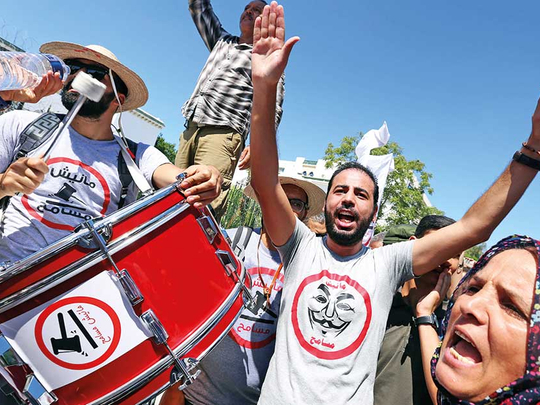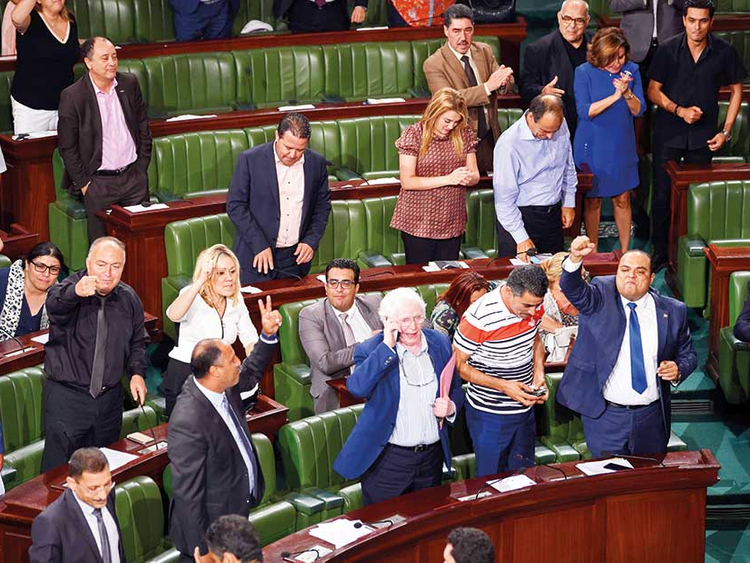
Washington: Just over a week ago, Tunisia became one of the only countries in the Arab world to allow Muslim women to marry non-Muslim men, flouting centuries of tradition and earning the accolades of human rights groups and activists around the world.
The measure has been cited as another example of Tunisia’s exceptionalism - as the country that kicked off the Arab Spring pro-democracy demonstrations that swept the Middle East and where the struggle for democracy hasn’t degenerated into war, unrest, military coups or greater repression.
Just the day before, however - little noticed abroad - Tunisia’s parliament passed a reconciliation law that seeks to protect civil servants from the old regime from prosecution under the country’s Truth and Dignity Commission that is dealing with the legacy of the brutal dictatorship of Zine Al Abidine Bin Ali that fell in 2011.
Many fear, in fact, that the Tunisian democratic experiment is under threat from a counterrevolution as more and more officials from the Bin Ali period, including the president and many in the new cabinet, are voted into power by an electorate tired of economic malaise and terrorist violence.
Initially after the revolution, Tunisia’s long oppressed Islamists came to power, but they were voted out in 2014, and 90-year-old politician Beiji Qaid Al Sebsi, who held several positions in pre-revolutionary governments, swept into power, along with many others from that time, promising competence, prosperity and, above all, security after a string of terrorist attacks.
One of Al Sebsi’s main campaign promises was a “reconciliation” law for the businessmen and civil servants of the old regime that now were being tried for past crimes, including torture, bribery and embezzlement. The argument was, these are the men and women who know how the country is run, so let’s get them back to work.
The timing of the reconciliation law with the liberalisation of women’s marriage may also not have been a coincidence, pointed out Amna Guellali of Human Rights Watch. The old dictatorship was often praised for its policy on women’s rights even as its repression of the opposition was ignored.
“For a long time, the old regime used progress on women’s rights as a fig leaf to distract from its repressive policies,” Guellali said in a statement.
“By championing women’s rights while at the same time expanding impunity for acts of corruption, the Tunisian government is reminding us of how these two contrasted realities worked in the past.”
According to Monica Marks, a researcher at Oxford University with extensive experience with Tunisia, the approach has been working, with nearly three times the amount of coverage in the foreign press for the marriage decision than for the amnesty law. Yet that amnesty is the biggest indication so far that the government is trying to undo the achievements of the revolution.
“It sends a huge symbolic signal that the state approves impunity for the powerful and the values of the revolution are no longer the center of the process,” she said.
Paradoxically, the law could not have passed without the support of the people that arguably suffered the most under the old regime: the Islamists. The Islamist Al Nahda Party, while the largest in parliament, is the junior coalition partner to Al Sebsi’s Nidaa Tunis party (Tunisia’s Call) and voted for the law - though many of its parliamentarians declined to show up the day of the vote.
Al Nahda echoed the government justification for the law in statement, calling it “an important step toward liberating the administration, achieving comprehensive national reconciliation and uniting the extended Tunisian political family on the bases of forgiveness and tolerance.” Said Ferjani, a leading member of the party, said that Al Nahda got rid of the law’s worst provisions - including giving amnesty for corrupt business executives - and came up with a compromise that would move the country forward.
“Many people think democracy didn’t work, parliament didn’t do its job. No, parliament has done a beautiful job, the president presented it the first time and it has changed radically,” Ferjani said.
“We want to really strengthen the center. We are in transition, and we need this transition to have this political center filled so Tunisia will have stability.”
What analysts also note is that in a region where the tide has turned aggressively against Islamist parties, Al Nahda’s best hope for its future may be to ally with members of the old establishment. The example of Egypt’s 2013 military coup and the subsequent crackdown on the Muslim Brotherhood there did not go unnoticed in Tunis.
“It’s more of a turn-the-page approach to human rights and transitional justice,” said Christopher Lamont, an expert on transitional justice in North Africa at the Netherlands’ University of Groningen. “They frame the justice and accountability debate as going back in the past. Reopening old wounds would be harmful when Tunisia’s priority should be economic development.”
After years of gathering material and getting organised, Tunisia’s Truth and Dignity Commission began hearings in November and for weeks electrified the country with the testimony of those tortured and abused by the old regime - many of them Islamists.
With the new law, the fear is that business executives and others brought before the commission will now have no incentive to cooperate as they simply wait for new amnesty laws.
For democracy advocates, it’s easy to feel a sense of despair about Tunisia’s difficult six-year journey since the revolution, as the economy has stumbled, and many of the bread-and-butter issues that first brought people to the streets have yet to be resolved.
Frustrated with a lack of progress and battered by repeated terrorist attacks, people seem ready to turn back to the old politicians who are claiming to be the only ones with the experience and competence to lead the country out of this mess. But would it come at the price of a return to the old ways?
The new law did not pass unopposed in Tunisia, and there have been protests against it across the country, including one on Saturday in the capital that drew thousands of primarily younger people.
Since the revolution, Tunisia’s once strangled civil society has blossomed with new unions, advocacy groups and many organisations dedicated to watching the politicians and hounding out corruption.
“When you see the big demonstrations in the streets over certain laws, people demanding freedom, you cannot say that people are not interested in political life in general or the future of transitional justice in Tunisia,” said Yousuf Belgacem, senior program manager for IWatch, which monitors elections and publishes reports on corruption.
While he’s not happy to see some of these old figures back, he said they are welcome to participate in politics, just not under the same old rules.
“It will never go back to the old way. We have our old figures, but we have a new system,” he said.
“We have people who can resist the mistakes made by the government who can hold the government accountable.”













